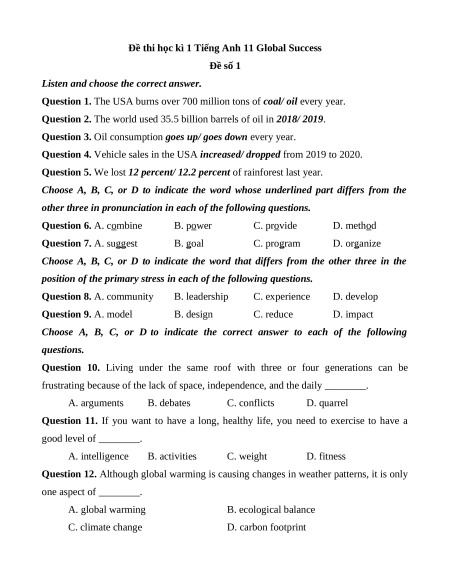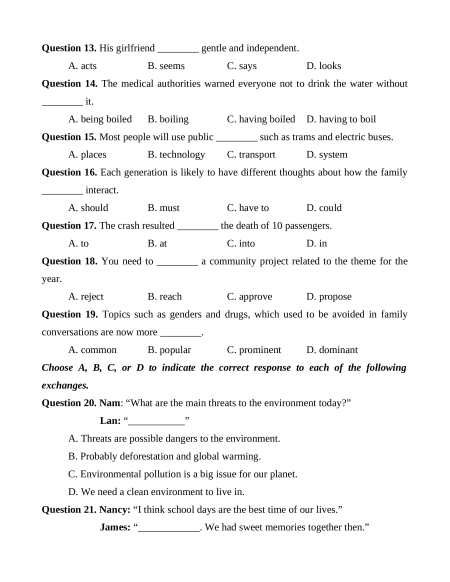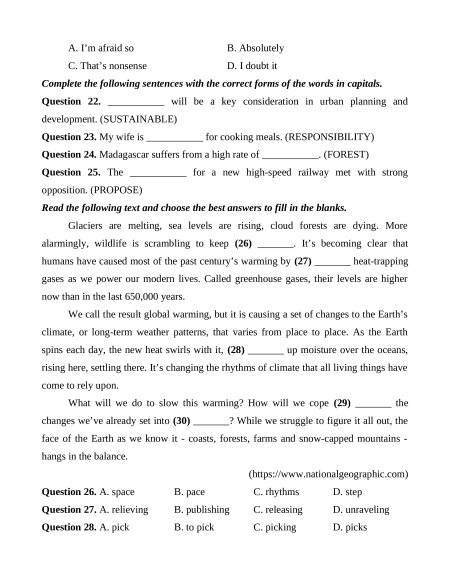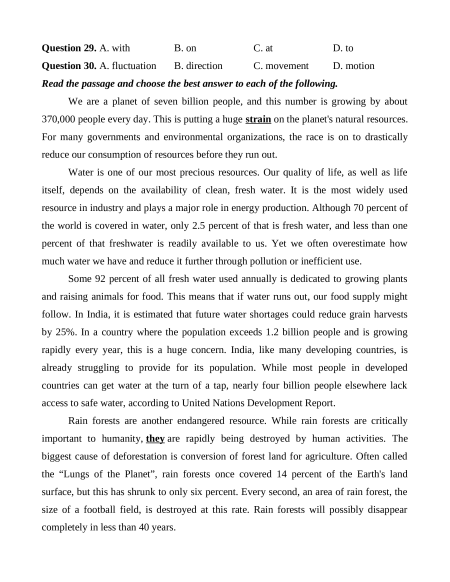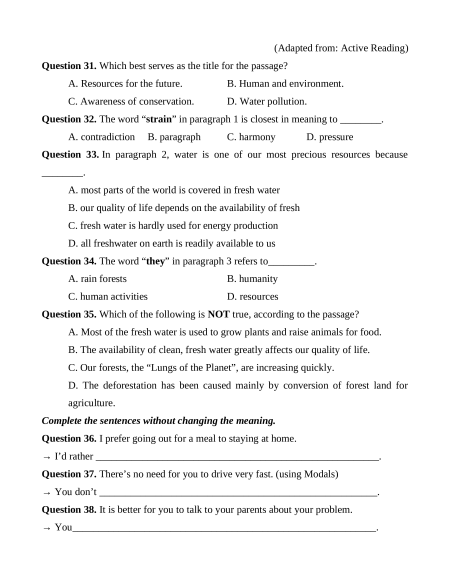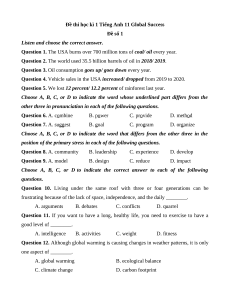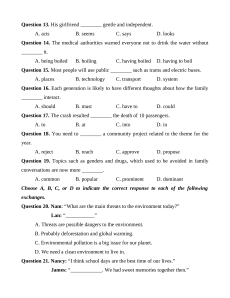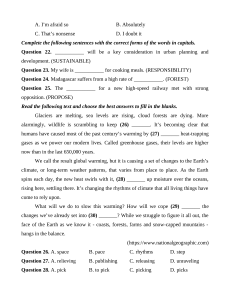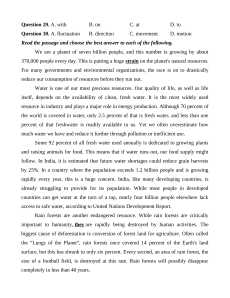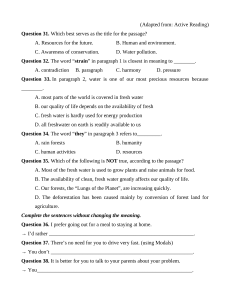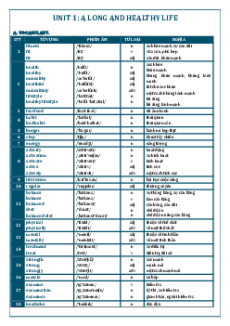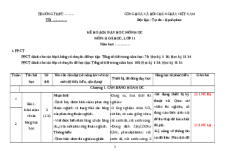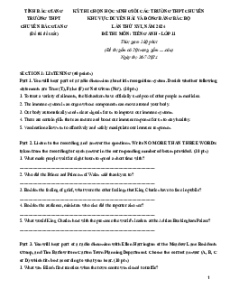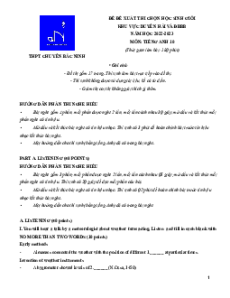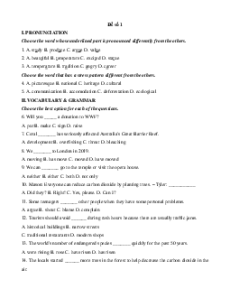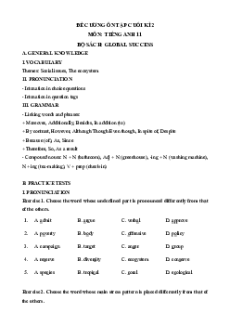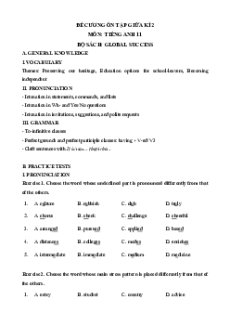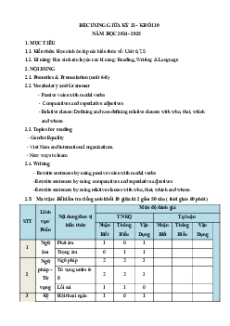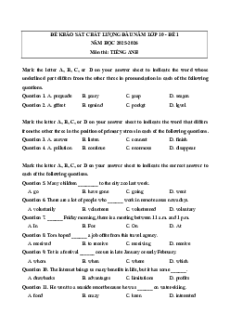Đề thi học kì 1 Tiếng Anh 11 Global Success Đề số 1
Listen and choose the correct answer.
Question 1. The USA burns over 700 million tons of coal/ oil every year.
Question 2. The world used 35.5 billion barrels of oil in 2018/ 2019.
Question 3. Oil consumption goes up/ goes down every year.
Question 4. Vehicle sales in the USA increased/ dropped from 2019 to 2020.
Question 5. We lost 12 percent/ 12.2 percent of rainforest last year.
Choose A, B, C, or D to indicate the word whose underlined part differs from the
other three in pronunciation in each of the following questions. Question 6. A. combine B. power C. provide D. method Question 7. A. suggest B. goal C. program D. organize
Choose A, B, C, or D to indicate the word that differs from the other three in the
position of the primary stress in each of the following questions.
Question 8. A. community B. leadership C. experience D. develop Question 9. A. model B. design C. reduce D. impact
Choose A, B, C, or D to indicate the correct answer to each of the following questions.
Question 10. Living under the same roof with three or four generations can be
frustrating because of the lack of space, independence, and the daily ________. A. arguments B. debates C. conflicts D. quarrel
Question 11. If you want to have a long, healthy life, you need to exercise to have a good level of ________. A. intelligence B. activities C. weight D. fitness
Question 12. Although global warming is causing changes in weather patterns, it is only one aspect of ________. A. global warming B. ecological balance C. climate change D. carbon footprint
Question 13. His girlfriend ________ gentle and independent. A. acts B. seems C. says D. looks
Question 14. The medical authorities warned everyone not to drink the water without ________ it. A. being boiled B. boiling
C. having boiled D. having to boil
Question 15. Most people will use public ________ such as trams and electric buses. A. places B. technology C. transport D. system
Question 16. Each generation is likely to have different thoughts about how the family ________ interact. A. should B. must C. have to D. could
Question 17. The crash resulted ________ the death of 10 passengers. A. to B. at C. into D. in
Question 18. You need to ________ a community project related to the theme for the year. A. reject B. reach C. approve D. propose
Question 19. Topics such as genders and drugs, which used to be avoided in family
conversations are now more ________. A. common B. popular C. prominent D. dominant
Choose A, B, C, or D to indicate the correct response to each of the following exchanges.
Question 20. Nam: “What are the main threats to the environment today?” Lan: “___________”
A. Threats are possible dangers to the environment.
B. Probably deforestation and global warming.
C. Environmental pollution is a big issue for our planet.
D. We need a clean environment to live in.
Question 21. Nancy: “I think school days are the best time of our lives.”
James: “____________. We had sweet memories together then.” A. I’m afraid so B. Absolutely C. That’s nonsense D. I doubt it
Complete the following sentences with the correct forms of the words in capitals.
Question 22. ___________ will be a key consideration in urban planning and development. (SUSTAINABLE)
Question 23. My wife is ___________ for cooking meals. (RESPONSIBILITY)
Question 24. Madagascar suffers from a high rate of ___________. (FOREST)
Question 25. The ___________ for a new high-speed railway met with strong opposition. (PROPOSE)
Read the following text and choose the best answers to fill in the blanks.
Glaciers are melting, sea levels are rising, cloud forests are dying. More
alarmingly, wildlife is scrambling to keep (26) _______. It’s becoming clear that
humans have caused most of the past century’s warming by (27) _______ heat-trapping
gases as we power our modern lives. Called greenhouse gases, their levels are higher
now than in the last 650,000 years.
We call the result global warming, but it is causing a set of changes to the Earth’s
climate, or long-term weather patterns, that varies from place to place. As the Earth
spins each day, the new heat swirls with it, (28) _______ up moisture over the oceans,
rising here, settling there. It’s changing the rhythms of climate that all living things have come to rely upon.
What will we do to slow this warming? How will we cope (29) _______ the
changes we’ve already set into (30) _______? While we struggle to figure it all out, the
face of the Earth as we know it - coasts, forests, farms and snow-capped mountains - hangs in the balance.
(https://www.nationalgeographic.com) Question 26. A. space B. pace C. rhythms D. step
Question 27. A. relieving B. publishing C. releasing D. unraveling Question 28. A. pick B. to pick C. picking D. picks Question 29. A. with B. on C. at D. to
Question 30. A. fluctuation B. direction C. movement D. motion
Read the passage and choose the best answer to each of the following.
We are a planet of seven billion people, and this number is growing by about
370,000 people every day. This is putting a huge strain on the planet's natural resources.
For many governments and environmental organizations, the race is on to drastically
reduce our consumption of resources before they run out.
Water is one of our most precious resources. Our quality of life, as well as life
itself, depends on the availability of clean, fresh water. It is the most widely used
resource in industry and plays a major role in energy production. Although 70 percent of
the world is covered in water, only 2.5 percent of that is fresh water, and less than one
percent of that freshwater is readily available to us. Yet we often overestimate how
much water we have and reduce it further through pollution or inefficient use.
Some 92 percent of all fresh water used annually is dedicated to growing plants
and raising animals for food. This means that if water runs out, our food supply might
follow. In India, it is estimated that future water shortages could reduce grain harvests
by 25%. In a country where the population exceeds 1.2 billion people and is growing
rapidly every year, this is a huge concern. India, like many developing countries, is
already struggling to provide for its population. While most people in developed
countries can get water at the turn of a tap, nearly four billion people elsewhere lack
access to safe water, according to United Nations Development Report.
Rain forests are another endangered resource. While rain forests are critically
important to humanity, they are rapidly being destroyed by human activities. The
biggest cause of deforestation is conversion of forest land for agriculture. Often called
the “Lungs of the Planet”, rain forests once covered 14 percent of the Earth's land
surface, but this has shrunk to only six percent. Every second, an area of rain forest, the
size of a football field, is destroyed at this rate. Rain forests will possibly disappear
completely in less than 40 years.
Đề thi cuối kì 1 Tiếng Anh 11 Global success (Đề 6)
887
444 lượt tải
MUA NGAY ĐỂ XEM TOÀN BỘ TÀI LIỆU
CÁCH MUA:
- B1: Gửi phí vào TK:
1133836868- CT TNHH DAU TU VA DV GD VIETJACK - Ngân hàng MB (QR) - B2: Nhắn tin tới Zalo VietJack Official ( nhấn vào đây ) để xác nhận thanh toán và tải tài liệu - giáo án
Liên hệ ngay Hotline hỗ trợ: 084 283 45 85
Đề thi được cập nhật liên tục trong gói này từ nay đến hết tháng 3/2024. Chúng tôi đảm bảo đủ số lượng đề đã cam kết hoặc có thể nhiều hơn, tất cả có BẢN WORD, LỜI GIẢI CHI TIẾT và tải về dễ dàng.
Để tải tài liệu gốc về máy bạn click vào nút Tải Xuống ở trên!
Thuộc bộ (mua theo bộ để tiết kiệm hơn):
- Tailieugiaovien.com.vn giới thiệu bộ đề thi cuối kì 1 kèm file nghe môn Tiếng anh 11 Global successmới nhất năm 2023 nhằm giúp Giáo viên có thêm tài liệu tham khảo ra đề thi Tiếng anh lớp 11.
- File word có lời giải chi tiết 100%.
- Mua trọn bộ sẽ tiết kiệm hơn tải lẻ 50%.
Đánh giá
4.6 / 5(887 )5
4
3
2
1
Trọng Bình
Tài liệu hay
Giúp ích cho tôi rất nhiều
Duy Trần
Tài liệu chuẩn
Rất thích tài liệu bên VJ soạn (bám sát chương trình dạy)
TÀI LIỆU BỘ BÁN CHẠY MÔN Tiếng Anh
Xem thêmTÀI LIỆU BỘ BÁN CHẠY Lớp 11
Xem thêmTài liệu bộ mới nhất

Đề thi học kì 1 Tiếng Anh 11 Global Success
Đề số 1
Listen and choose the correct answer.
Question 1. The USA burns over 700 million tons of coal/ oil every year.
Question 2. The world used 35.5 billion barrels of oil in 2018/ 2019.
Question 3. Oil consumption goes up/ goes down every year.
Question 4. Vehicle sales in the USA increased/ dropped from 2019 to 2020.
Question 5. We lost 12 percent/ 12.2 percent of rainforest last year.
Choose A, B, C, or D to indicate the word whose underlined part differs from the
other three in pronunciation in each of the following questions.
Question 6. A. combine B. power C. provide D. method
Question 7. A. suggest B. goal C. program D. organize
Choose A, B, C, or D to indicate the word that differs from the other three in the
position of the primary stress in each of the following questions.
Question 8. A. community B. leadership C. experience D. develop
Question 9. A. model B. design C. reduce D. impact
Choose A, B, C, or D to indicate the correct answer to each of the following
questions.
Question 10. Living under the same roof with three or four generations can be
frustrating because of the lack of space, independence, and the daily ________.
A. arguments B. debates C. conflicts D. quarrel
Question 11. If you want to have a long, healthy life, you need to exercise to have a
good level of ________.
A. intelligence B. activities C. weight D. fitness
Question 12. Although global warming is causing changes in weather patterns, it is only
one aspect of ________.
A. global warming B. ecological balance
C. climate change D. carbon footprint

Question 13. His girlfriend ________ gentle and independent.
A. acts B. seems C. says D. looks
Question 14. The medical authorities warned everyone not to drink the water without
________ it.
A. being boiled B. boiling C. having boiled D. having to boil
Question 15. Most people will use public ________ such as trams and electric buses.
A. places B. technology C. transport D. system
Question 16. Each generation is likely to have different thoughts about how the family
________ interact.
A. should B. must C. have to D. could
Question 17. The crash resulted ________ the death of 10 passengers.
A. to B. at C. into D. in
Question 18. You need to ________ a community project related to the theme for the
year.
A. reject B. reach C. approve D. propose
Question 19. Topics such as genders and drugs, which used to be avoided in family
conversations are now more ________.
A. common B. popular C. prominent D. dominant
Choose A, B, C, or D to indicate the correct response to each of the following
exchanges.
Question 20. Nam: “What are the main threats to the environment today?”
Lan: “___________”
A. Threats are possible dangers to the environment.
B. Probably deforestation and global warming.
C. Environmental pollution is a big issue for our planet.
D. We need a clean environment to live in.
Question 21. Nancy: “I think school days are the best time of our lives.”
James: “____________. We had sweet memories together then.”

A. I’m afraid so B. Absolutely
C. That’s nonsense D. I doubt it
Complete the following sentences with the correct forms of the words in capitals.
Question 22. ___________ will be a key consideration in urban planning and
development. (SUSTAINABLE)
Question 23. My wife is ___________ for cooking meals. (RESPONSIBILITY)
Question 24. Madagascar suffers from a high rate of ___________. (FOREST)
Question 25. The ___________ for a new high-speed railway met with strong
opposition. (PROPOSE)
Read the following text and choose the best answers to fill in the blanks.
Glaciers are melting, sea levels are rising, cloud forests are dying. More
alarmingly, wildlife is scrambling to keep (26) _______. It’s becoming clear that
humans have caused most of the past century’s warming by (27) _______ heat-trapping
gases as we power our modern lives. Called greenhouse gases, their levels are higher
now than in the last 650,000 years.
We call the result global warming, but it is causing a set of changes to the Earth’s
climate, or long-term weather patterns, that varies from place to place. As the Earth
spins each day, the new heat swirls with it, (28) _______ up moisture over the oceans,
rising here, settling there. It’s changing the rhythms of climate that all living things have
come to rely upon.
What will we do to slow this warming? How will we cope (29) _______ the
changes we’ve already set into (30) _______? While we struggle to figure it all out, the
face of the Earth as we know it - coasts, forests, farms and snow-capped mountains -
hangs in the balance.
(https://www.nationalgeographic.com)
Question 26. A. space B. pace C. rhythms D. step
Question 27. A. relieving B. publishing C. releasing D. unraveling
Question 28. A. pick B. to pick C. picking D. picks

Question 29. A. with B. on C. at D. to
Question 30. A. fluctuation B. direction C. movement D. motion
Read the passage and choose the best answer to each of the following.
We are a planet of seven billion people, and this number is growing by about
370,000 people every day. This is putting a huge strain on the planet's natural resources.
For many governments and environmental organizations, the race is on to drastically
reduce our consumption of resources before they run out.
Water is one of our most precious resources. Our quality of life, as well as life
itself, depends on the availability of clean, fresh water. It is the most widely used
resource in industry and plays a major role in energy production. Although 70 percent of
the world is covered in water, only 2.5 percent of that is fresh water, and less than one
percent of that freshwater is readily available to us. Yet we often overestimate how
much water we have and reduce it further through pollution or inefficient use.
Some 92 percent of all fresh water used annually is dedicated to growing plants
and raising animals for food. This means that if water runs out, our food supply might
follow. In India, it is estimated that future water shortages could reduce grain harvests
by 25%. In a country where the population exceeds 1.2 billion people and is growing
rapidly every year, this is a huge concern. India, like many developing countries, is
already struggling to provide for its population. While most people in developed
countries can get water at the turn of a tap, nearly four billion people elsewhere lack
access to safe water, according to United Nations Development Report.
Rain forests are another endangered resource. While rain forests are critically
important to humanity, they are rapidly being destroyed by human activities. The
biggest cause of deforestation is conversion of forest land for agriculture. Often called
the “Lungs of the Planet”, rain forests once covered 14 percent of the Earth's land
surface, but this has shrunk to only six percent. Every second, an area of rain forest, the
size of a football field, is destroyed at this rate. Rain forests will possibly disappear
completely in less than 40 years.

(Adapted from: Active Reading)
Question 31. Which best serves as the title for the passage?
A. Resources for the future. B. Human and environment.
C. Awareness of conservation. D. Water pollution.
Question 32. The word “strain” in paragraph 1 is closest in meaning to ________.
A. contradiction B. paragraph C. harmony D. pressure
Question 33. In paragraph 2, water is one of our most precious resources because
________.
A. most parts of the world is covered in fresh water
B. our quality of life depends on the availability of fresh
C. fresh water is hardly used for energy production
D. all freshwater on earth is readily available to us
Question 34. The word “they” in paragraph 3 refers to_________.
A. rain forests B. humanity
C. human activities D. resources
Question 35. Which of the following is NOT true, according to the passage?
A. Most of the fresh water is used to grow plants and raise animals for food.
B. The availability of clean, fresh water greatly affects our quality of life.
C. Our forests, the “Lungs of the Planet”, are increasing quickly.
D. The deforestation has been caused mainly by conversion of forest land for
agriculture.
Complete the sentences without changing the meaning.
Question 36. I prefer going out for a meal to staying at home.
→ I’d rather _______________________________________________________.
Question 37. There’s no need for you to drive very fast. (using Modals)
→ You don’t ______________________________________________________.
Question 38. It is better for you to talk to your parents about your problem.
→ You___________________________________________________________.
